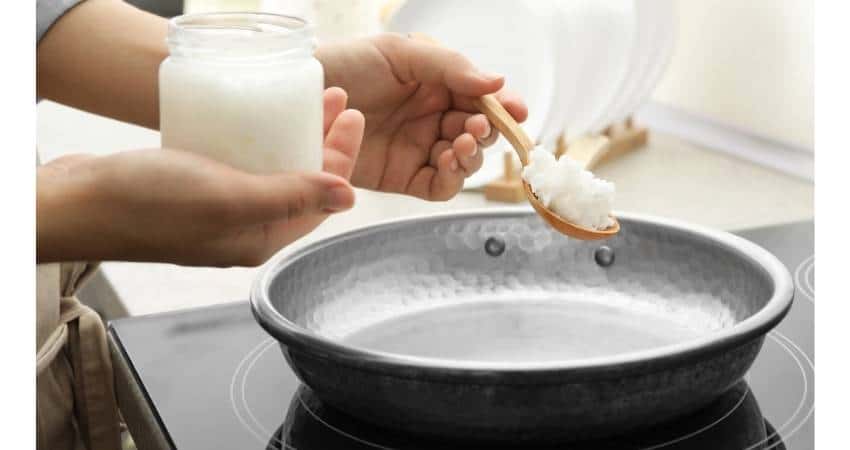How To Freeze Coconut Oil
Freezing coconut oil sounds like a wonderful idea to preserve it longer which prompts the question, can you freeze coconut oil?
Coconut oil can be frozen for up to two years. The best way is to melt the oil and divide it into serving sizes. Place them into the freezer until frozen and then transfer the frozen servings into freezer safe, food storage bags. Date the bag, remove the excess air and store them in the freezer.
Freezing coconut oil is a great way to increase the shelf-life of the oil, prevent waste and save you some money.
During my health coaching sessions I often get asked about freezing coconut oil. This article will explain each step in detail with helpful tips I do making the freezing process as easy as possible.

How To Freeze Coconut Oil
There’s a few more steps involved freezing coconut oil than most other foods because of it being solid or a liquid at different temperatures.
This Is How To Freeze Coconut Oil:
- Melt the coconut oil.
- Divide the coconut oil into desired portions.
- Pour the oil into portion size containers.
- Cover with plastic wrap.
- Place the containers into the freezer until frozen.
- Remove the frozen portions and transfer them to a freezer bag.
- Remove excess air and seal.
- Date the bag and store in the freezer up to two years.
Let’s break down each step listed above and discuss them in detail.
1. Melt the coconut oil.
Before coconut oil can be frozen, it must be melted. Coconut oil is typically solid at temperatures below 76℉, therefore you will need a way to melt the coconut oil before freezing it.
Don’t melt it too fast, as coconut oil will begin to break down if heated too quickly.
In addition, try remembering it’s not being cooked. Heat it enough to liquefy it. One way to accomplish this is by running hot water over the container until it melts. This will melt the oil without cooking it.
2. Portion the Coconut Oil
Once the coconut oil has been completely melted in its container, divide the coconut into individual servings as close to one cup (or whichever size portion you need) as possible.
You can use ice cube trays or any freezer-safe container to portion the coconut oil for freezing. Creating smaller portions keeps the amount of coconut oil even, which will make it easier to use once it has been taken out of the freezer.
3. Cover the Oil To Prevent Air From Getting to It
After dividing the coconut oil, cover it with plastic wrap or aluminum foil. Secure tightly around all sides of each portioned serving. The coconut oil must be completely covered to prevent air from getting to it. This can cause the coconut oil to spoil more quickly once frozen or thawed again.
4. Freeze for Two Hours
Freeze for two hours or until completely frozen.
5. Remove The Oil From The Containers
Once the coconut has been in the freezer for several hours, remove it from its individual containers and store it in a freezer-safe bag or container.
6. Store in Freezer Safe Bags
Store coconut oil portions between sheets of parchment paper or waxed paper before placing them inside an airtight freezer bag or container. Remove as much excess air as possible.
7. Date The Container
Dating the container is a reminder of when the oil was frozen and stored. After two years the coconut oil should be used or discarded. Any longer and the oil loses its quality.
How To Safely Thaw Coconut Oil
One of the most common questions asked by coconut oil users is, how to melt coconut oil into liquid.
I melt coconut oil into liquid by using one of the four methods:
- Microwave the frozen coconut oil in a microwave safe container. Stir the oil occasionally to prevent burning. Choose from the option to defrost and microwave the oil for 30 seconds at a time. Loosely cover the top to prevent splattering.
- Place the frozen coconut oil into a sauce pan and heat at low to medium heat. Stir while the oil is melting.
- If the frozen coconut oil is in a jar, place the jar into hot water until the oil melts.
- Let the coconut sit out on the counter. This method will take several hours before the oil reaches the desired consistency. This method only works if the room temperature is warmer than 76 degrees.
Find out if olive oil or sesame oil provided the most benefits in my article, Sesame Oil vs Olive Oil: Which is Better? Let’s Compare.
Frozen Coconut Oil Facts
Coconut oil will not freeze in the winter if the room temperature remains higher than 76 degrees Fahrenheit. 76 degrees is the oil’s freezing point. Therefore, if the room gets colder, the coconut oil will then turn solid.
The freezing point of coconut in Fahrenheit is 76 degrees.
Coconut becomes liquid at temperatures higher than 76 degrees Fahrenheit.
It is okay if coconut oil melts. It has a shelf life of two years. Coconut oil will melt at temperatures higher than 76 degrees Fahrenheit.
Freezing coconut oil doesn’t damage it if frozen properly. Coconut oil should be frozen in freezer bags or containers without any excess air to prevent quality loss.
If you have any questions to ask me about this article don’t hesitate to comment below or email us. You can find an email on our contact page.
Read Next – More Oil & Food Storage Articles!
Olive Oil vs Coconut Oil: Which is Better? Let’s Compare
Can I Replace Olive Oil With Coconut Oil?
Extra Virgin Olive Oil vs Olive Oil: A Complete Comparison
How To Store Wheat The Proper Way
This Is The Best way To Store Kimchi
